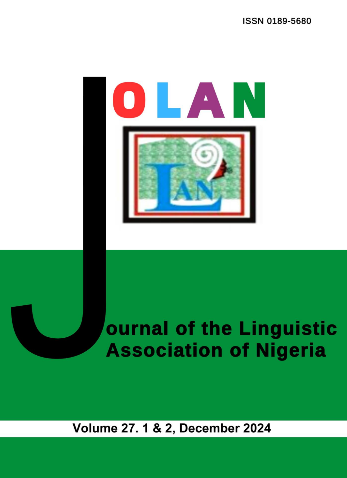The social context for language policy implementation in Nigeria: A neglected situation?
DOI:
https://doi.org/10.60787/jolan.vol5no1.411Keywords:
Language policy, multilingualism, linguistic diversity, Nigerian indigenous languagesAbstract
This paper examines the complex relationship between Nigeria’s linguistic diversity and the social context in which language policies are implemented. It focuses on the current state of language policy implementation in Nigeria and explores the reasons behind its neglect in many parts of the country. The primary objective is to analyze how social factors such as ethnicity, education, and the urban - rural divide influence language use and policy effectiveness. Drawing on the language planning and policy frameworks of Spolsky and Fishman, the study investigates how language choice in multilingual communities shapes communication in education, government, and the media. Adopting a qualitative research design, data were collected through observations in various regions, with attention to the interaction between indigenous languages and English in everyday contexts. A contentbased analysis reveals a significant gap between official language policies and their practical implementation. The findings highlight the urgent need for a more inclusive language policy that integrates indigenous languages into education, government, and
media. Recommendations include the introduction of bilingual education, increased representation of indigenous languages in the media, and revision of the national language policy to reflect Nigeria’s linguistic diversity. The paper concludes that without such reforms, the preservation of Nigeria’s rich linguistic heritage and effective communication in multilingual communities will remain elusive, thereby impeding social cohesion and educational progress.
References
Alexander, N. (2003). The African renaissance and the use of African languages in tertiary education. Cape Town: PRAESA.
Bamgbose, A. (2011). African language development and language policy. Cape Town: The Centre for Advanced Studies of African Society.
Bamgbose, A. (2011). Language and the nation: The language question in sub-Saharan Africa. Edinburgh: Edinburgh University Press.
Bourdieu, P. (1991). Language and symbolic power. Harvard: Harvard University Press. BusinessDay. (2024, February 22). Mother tongue now primary medium of instruction for pupils – UBEC, NERDC. Retrieved from https://businessday.ng
Cooper, R. L. (1989). Language planning and social change. Cambridge: Cambridge University Press.
Cavallaro, F., & Ng, B. C. (2009). Language Policies and Linguistic Culture in Singapore. World Englishes, 28(2), 203–215.
Federal Republic of Nigeria. (2014). National Policy on Education (6th ed.). Lagos: Nigerian Educational Research and Development Council (NERDC).
Federal Ministry of Education. (2023). National Language Policy. Abuja: Nigerian Educational Research and Development Council (NERDC).
Fishman, J. A. (1968). Readings in the sociology of language. The Hague: Mouton Publishers.
Fishman, J. A. (1991). Reversing Language Shift: Theoretical and Empirical Foundations of Assistance to Threatened Languages. Multilingual atters.
Heller, M. (1999). Linguistic minorities and modernity: A sociolinguistic ethnography. Longman.
Kaplan, R. B., & Baldauf, R. B. (1997). Language Planning: From practice to theory. Multilingual Matters.
Nigerian Educational Research and Development Council (NERDC). (2023). National Language Policy. Abuja: NERDC. Ricento, T. (2006). An Introduction to language policy: Theory and method. Blackwell Publishing.
Spolsky, B. (2004). Language policy. Cambridge : Cambridge University Press. The Nation. (2022, November 30). FEC okays National Language Policy for primary education. Retrieved from https://thenationonlineng.net
UNESCO. (2023). Enhancing learning through multilingual education: A globalperspective. Paris: UNESCO Publishing. Retrieved from https://unesdoc.unesco.org/Withinnigeria. (2025, June 28). The language barrier: How English-only policies are harming rural education in Nigeria. Retrieved from https://www.withinnigeria.com
Downloads
Published
How to Cite
Issue
Section
License
Copyright (c) 2025 Journal of The Linguistic Association of Nigeria

This work is licensed under a Creative Commons Attribution-NonCommercial-ShareAlike 4.0 International License.














